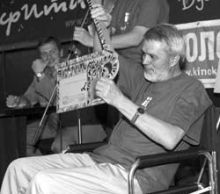The Vidkryta Nich (Open Night) film and video festival occupies a special place among the annual events packing Kyiv’s cultural calendar. This event is an all-night, non-stop screening of dozens of short films. It is also a truly Ukrainian film festival, which is especially important. The venue of the festival is unique: the viewing platform on Uzdykhalnytsia Hill, beside the legendary Richard’s Castle on Andriyivsky Uzviz. The time is special, too-early July, the in-between season interval. Despite the timing, the site was packed, and viewers throughout Ukraine were able to watch the festival lineup.
This festival has always attracted keen interest. This was the tenth year of Open Night (“Take 10”) and well organized. This year the festival had an additional interactive television dimension. Its long-term coordinator and founder, noted film director Mykola Illienko, managed to have all the films broadcast on UT-1. This screening plus blitz interviews with filmmakers and viewers’ telephone voting turned out to be a nice promotional discovery for the festival organizers and a real breakthrough to mass audiences.
The competition program was packed. There have never been so many interesting and professionally made films. It seems as though the filmmaking process is gradually gaining momentum in Ukraine (let’s keep our fingers crossed) and producing concrete results. Without a doubt, three productions took the lead: Taras Tomenko’s Liza, Oleksandr Khrebtov’s Velvet Season, and Alla Pasikova’s Philosophy. The first film won the prizes for Best Film and Best Cinematographer (Taras Tomenko) in the Non-Feature Video category.
The second film won awards for Best Film, Best Cinematographer (Oleksandr Morderer), Best Actress (Lina Budnyk), and Best Actor (Anatoliy Bevz) in the category of Feature Film. Philosophy won awards for Best Film, Best Director, and Best Script Writer (Olena Ursaki) in the Student Feature Film nomination.
Liza is a heartbreaking documentary about an 11-year-old homeless girl. The director does not intrude; he is simply recording. Some scenes are touching, others are horrible, yet Tomenko manages to draw out a sharp intellect, a sincere and sensitive heart, and a keen sense of dignity from this desperately lonely and precocious little person.
Velvet Season is a short tale about love. The filmmaker tells the story of an elderly married couple without oversentimentalizing and leaves the viewer enough room for empathy. After ruining nearly her whole married life living with an authoritarian relative, Nina (Lina Budnyk) and Semen (Anatoliy Bevz) finally get the chance to do something they really want. Their love is so strong they manage somehow to deceive time. The final scene, where they shed their clothes together with their lost years and plunge into the sea for a swim, is radiant with the energy and tenderness of true youth.
Philosophy has a simple plot, and most of the film focuses on two eccentrics from the provinces, Tolya (Mykola Boklan) and Vanya (Roman Havryliuk) who just sit and chat. This was enough for the director and script writer to portray two human destinies and in the space of 15 minutes to flesh out their past and future. The main characters are strongly reminiscent of Andrei Platonov’s simple but sincere “secret people.” They live through all their joys and sorrows with what is probably best described as Taoist endurance.
Roman Bondarchuk’s Mykola and the German was the indisputable leader in the Student Feature-Length Video nomination, and it won the Best Film, Best Cinematographer (Andriy Lysetsky) and Best Director awards. The film is a reconstruction of the reminiscences of a man who survived the Nazi occupation thanks to a German officer’s benevolence.
The jury named Serhiy Marchenko Best Director for his Polissia Images in the category of Best Non-Feature Professional Video. It features enchanting scenes from the daily life of the Polishchuks. In the animation slot Yevhen Aliokhyn was unmatched with his puppet film A Favor That Backfired.
Viktoria Melnykova’s Best Wishes from Enver received two awards in the category Non-Feature Celluloid Film. This biographical sketch about the well-known musician Enver Izmaylov also won the Special Jury Prize and cinematography award (Valentyn Melnychenko). The Special Jury Prize also went to Kostiantyn Bochkariov’s interesting black and white dream-film entitled A Girl and the Moon in the Student Feature Film nomination. In that nomination Vasyl Kulyk was named Best Cinematographer in Yevhen Khvorostianko’s The Nest, while Serhiy Tolkushkin was recognized as Best Director for his mini-comedy Veni! Vidi! Vici!
Volodymyr Tsyvinsky’s unusual video While the Egg is Boiling, the Sun Sets appeared to be the only contender and laureate in the Parallel Cinema nomination. Oleksandr Ihnatusha’s Hup! One, Two! was even more enigmatic and won the One Frame Premiere nomination. In a separate competition for Best Script the first prize went to Maryna Ponomarenko (One Wish, or a Christmas Tale) and two second prizes to brothers Yuriy and Yevhen Hnatenko (September 1st Player) and Maria Dukhota (The Rescuer).
Practically no one departed with hard feelings; everybody received a digital and conventional photo camera, compact tape recorders, and other crucial filmmaking equipment. Although the prizes are modest, this Oscar-style principle of awards, to quote Mykhailo Illienko, proved to be an important professional factor for the young filmmakers. Open Night is turning into an influential festival, as fresh new forces are coming into the profession. One can only hope that this process continues to be a mutually rewarding one.








